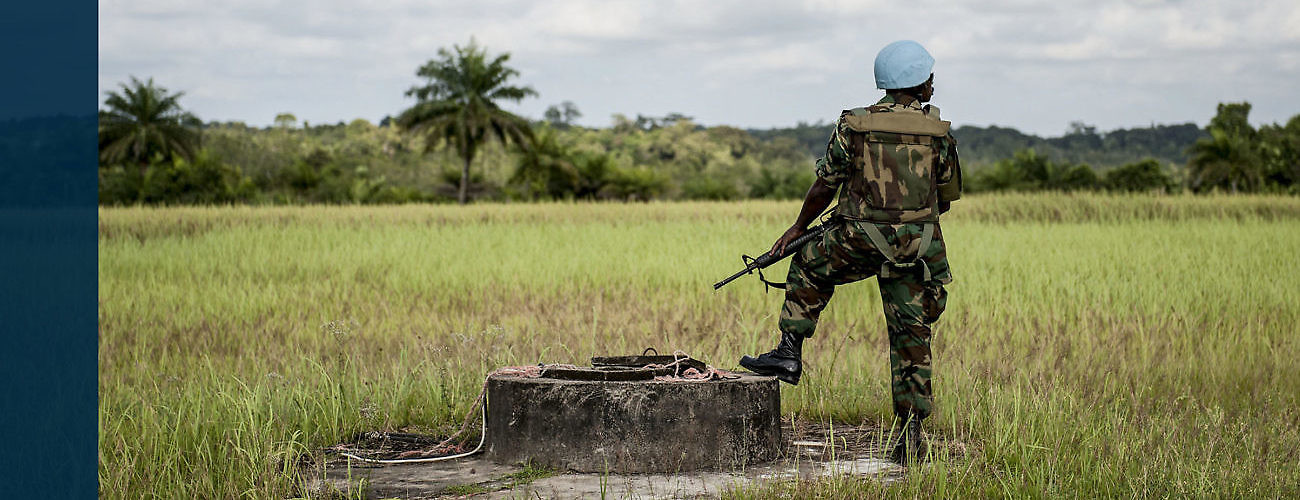A Ghanaian peacekeeper with the UN Mission in Liberia (UNMIL) on guard duty in Cestos City, Liberia. (UN Photo/Staton Winter)
Over the past 70 years, United Nations peacekeeping has proven highly resilient and adaptive in response to changing threats to international peace and security, and to shifting political dynamics in the UN Security Council. From its origins during the Cold War monitoring ceasefires between states, to supporting comprehensive peace agreements after intrastate armed conflict, to responding to risks of mass atrocities, peacekeeping has continued to evolve.
Today, UN peacekeeping must navigate a divided Security Council, growing disagreement over underlying normative principles, and increasing financial pressure—the last of which is likely to be exacerbated by the economic consequences of COVID-19. Great and regional power involvement in intrastate conflict, violent extremism and terrorism, fragmented armed groups, and intercommunal violence are testing the boundaries of what UN peacekeeping can achieve.
Recent and ongoing UN peacekeeping transitions, meanwhile, demonstrate the UN’s contribution to stability, while underscoring its limitations in addressing structural drivers of violence, including weak state institutions, social injustice, repression, and corruption. In several contexts, climate change is amplifying conflict risks, making stabilization mandates harder to achieve. Amid these trends, it is unclear whether UN peacekeeping will continue to be an effective, appropriate or even desirable response to emerging security challenges in the decade to come, and how it should adapt to remain so.
A lot of attention on UN peacekeeping often revolves around missions firefighting crises, or on Security Council discussions and mandate renewals. However, the upcoming 75th anniversary of the UN provides a useful moment to examine some important aspects of peacekeeping and where it might be headed in the future.
Among the most consequential of trends for peacekeeping is the impact that the shift in the global balance of power is having on established peacekeeping norms. These shifts are playing out in bilateral relations between P5 countries, within negotiations on trade and climate change, and in the Security Council. What is at stake is the general consensus on the role of the UN in addressing international peace and security.
A related trend is the rise in challenges to liberalism and the effect this is having on the ability of UN peacekeeping missions to support human rights, democratic elections, and security and justice reform. As challenges to Western liberalism are increasingly arising from within Western countries, the foundations of agreement on the centrality of associated principles makes the work of UN peacekeeping on these matters more complicated in conflict or post-conflict contexts.
In recent years, the UN has been financially constrained by budget cuts and late payments by member states. With peacekeeping taking up the largest portion of the budget, the long-term impact of financial constraints and increased political and financial conservatism by member states in the Security Council is still unclear. There is potential for a profound shift in how peacekeeping is carried out, as the Security Council could prioritize nimble, cheaper special political missions over large peacekeeping operations that have been the norm for the past 30 years.
At the same time that UN peacekeeping has faced cuts, regional and subregional organizations, like the African Union (AU), or coalitions of member states, like the G5, have taken on various peacemaking and peacekeeping roles. A question in this regard has been the role of the UN as an organization in supporting these initiatives and, in particular, the role of existing peacekeeping missions. If more responsibility for peacemaking and peacekeeping falls on the AU or coalitions of states, particularly in situations marked by stabilization or counter-terrorism, the UN may be tasked with taking a greater role supporting such missions, with possible consequences for its political role and perceived impartiality.
There are also a range of questions on core principles, aims, and agendas set out by the Security Council that may be significantly impacted by the aforementioned trends. For example, how can peacekeeping operations catalyze implementation of the women, peace, and security agenda? What will the future of protection of civilians look like? Should the UN rethink the role of the peacekeeping in relation to the broader UN system and the wider ecosystem of national, regional and international stakeholders to better address drivers of violence and instability?
Though none of these questions have straightforward answers, they are all likely to have significant consequences for UN peacekeeping and demand ongoing examination. By exploring potential answers to these questions, it will be possible to anticipate where current approaches may need to be revised or rethought, and to identify areas where further research could help inform decision-making by Secretary-General Antonio Guterres, Security Council members, troop- and police-contributing countries, regional and subregional partners, and other stakeholders committed to multilateral responses to manage international threats to peace and security.





